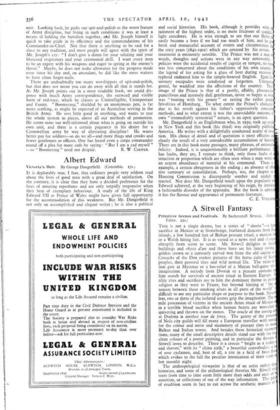Albert Edward
Victoria's Heir. By George Dangerfield. (Constable. 15s.)
IT is deplorably true, I fear, that ordinary people very seldom read about the lives of good men with a great deal of satisfaction. On the contrary, it is clear that they have a decided preference for the lives of amusing reprobates and are only torpidly responsive when they hear of exemplary behaviour. A study of the life of King Edward VII as Prince of Wales might have given full opportunity for the accommodation of this weakness. But Mr. Dangerfield is not only an accomplished and elegant writer ; he is also a political and social historian. His book, although it provides Witty tainrnent of the highest order, is no mere fricassee of scandal, light anecdotes. He is wise enough to see that our Bertie easily become a bore if we had too much of him, and he g5 brisk and resourceful account of events and circumstances d the sixty years (1841-1901) which are covered by his review. treatment is eminently sensible. The Prince was not a man words, thoughts and actions were in any way noteworthy. policies were the accidental results of caprice or temper, no roe- was less concerned about the conditions of his own coo= ; the legend of his asking for a glass of beer during recover typhoid endeared him to the simple-hearted English. Een hi savoury escapades were condoned or forgotten. Unrepem genial, he waddled into the affections of the country. The image of the Prince is that of a portly, affable, pleasure-lo; punctilious and intensely dull gentleman, never so happy as wh was "boating with his grocer" or tasting the rather pond: frivolities of Homburg. To what extent the Prince's character due to his revolt against his father's oppressively conscien methods, and to what extent it was the unavoidable outcome of own "irremediably terrestrial" nature, is an open question.
Mr. Dangerfield is an Englishman who, in 193o, took up resid in New York and this book (his third) was originally publishe America. He writes with a delightfully condensed acuity of obse tion. His choice of detail and of quotation is most effective an clearly the result of a very considerable accumulation of knowle There are in this book many passages, many phrases, of extrao felicity. Indeed, it is unquestionably a brilliant performance. has faults, they are, I venture to think, only those faults of 'struction or proportion which are often seen when a man writes an urgent abundance of material at his command. There is. example, a certain abruptness in the ending ; an absence of afi tive summary or consolidation. Perhaps, too, the chapter on Housing Commission is discrepantly sombre and unduly tracted. Nor does Mr. Dangerfield touch upon the popularity v Edward achieved, at the very beginning of his reign, by introciu a fashionable disorder of the appendix. But the book is admira it has the flavour and appearance of permanent literature.
C. E. VULLIAM


























 Previous page
Previous page